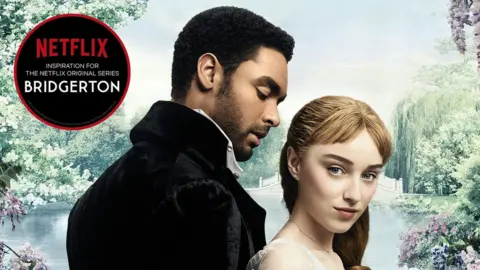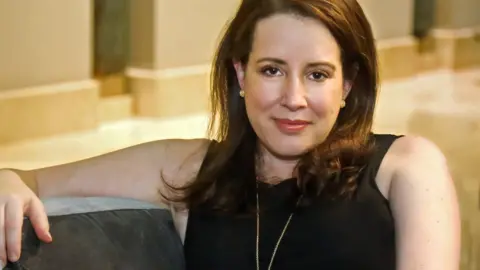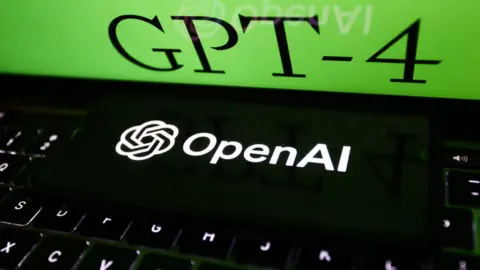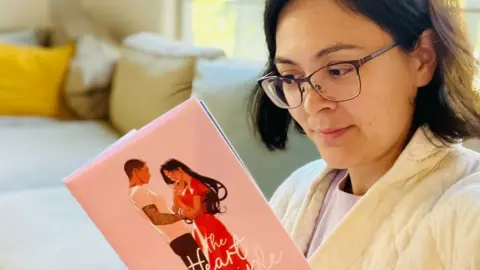Are romance authors at risk from book-writing chatbots?
 Julia Quinn
Julia QuinnSales of romantic fiction continue to boom, but with the genre often accused of being formulaic, are its authors at risk of being replaced by book-writing chatbots?
Julia Quinn is the author of the bestselling Bridgerton series of novels, which follow the love lives of eight siblings from a family of that name in 19th Century London.
She says that the inspiration behind the books started with a duke.
"Definitely the character of Simon came first," says Ms Quinn, in reference to the fictional Simon Basset, the brooding, troubled Duke of Hastings.
"I came up with this tortured character, and then I thought, 'okay, well, he needs to fall in love with somebody who comes from the exact opposite background'."
As the duke is estranged from his father, Ms Quinn decided that he needed "to fall in love with someone with just the best family ever that you could imagine in that time period". She adds: "And that's how the Bridgertons came around really, as a foil."
It is this sort of characterisation and human touch that helps to make romance novels enduringly popular - and lucrative for successful authors in the genre.
Seattle-based Ms Quinn is said to have more than 20 million books in print in the US alone, and the TV adaptation of Bridgerton is one of the Netflix's most-watched shows.
 Roberto Filho
Roberto FilhoBut is rapidly-advancing technology about to threaten the livelihoods of romantic fiction authors?
The problem is the release last autumn of ChatGPT - an advanced language processing technology, developed by OpenAI.
The artificial intelligence (AI) was trained using text databases from the internet, including books, magazines and Wikipedia entries. In all 300 billion words were fed into the system.
When prompted, ChatGPT can produce intricate writing that can appear to have been written by a human.
It has made many headlines, with particular concern that it can be used by students to write their essays.
ChatGPT can also be tasked to write pieces of fiction in a certain genre. And while the quality definitely isn't there yet, the technology will continue to get better.
OpenAI launched the latest version of ChatGPT this week, and other firms are working on rival systems.
Ms Quinn says she remembers reading some AI written romantic fiction a few years ago, "and it was terrible". "And so of course I said 'oh, it could never be a good one'."
And then ChatGPT arrived. "It makes me really kind of queasy," admits Ms Quinn. However she adds that she remains optimistic that human creativity will come out on top.
"I think so much in fiction is about the writer's voice," she says. "And I'd like to think that's something that an AI bot can't quite do."
 Getty Images
Getty ImagesJill Rettberg, an expert on chatbots, says it is "really important" to just understand how they work.
"The autocorrect on your phone, if you say, 'I'm on my….' it will predict 'way'," says the co-director of the Center for Digital Narrative at the University of Bergen in Norway.
"All these GPT things are exactly the same, just prediction, but with much, much more text."
This innovation is unfolding during a romance-reading renaissance. Last year, sales of romantic fiction in the US shot up by 52.4%, compared with an increase of just 8.5% for adult fiction overall.
Meanwhile, sales of the genre in the UK have increased more than two fold over the past three years.
Jen Prokop, who co-presents the romance novel podcast Fated Mates, attributes part of this growth to social media. She says this helps fans connect with each other, and share their enthusiasm for the genre.
"Now with the rise of TikTok, podcasts, Twitter... romance readers are finding each other," says Chicago-based Ms Prokop, who also reviews and edits romance literature.
She adds that fans of the genre are also now far happier to admit it. "When we say romance is becoming more mainstream, or more popular, part of that, I think, is actually just that readers are saying, 'I'm not going to be ashamed of this anymore'."
Helen Hoang, bestselling author of romance books set in modern times, says there is now much more diversity in the genre, both in terms of the fictional characters and the writers. She claims this is also helping to bring more readers in the fold.
Her book The Kiss Quotient, published in 2018, tells the story of a young autistic woman who overcomes her fear of dating to fall in love with a man of Swedish and Vietnamese descent.
 Helen Hoang
Helen Hoang"And I felt like it inspired publishers to really get on board with bringing in diverse authors, and these books that were featuring new kinds of narratives that you hadn't seen before," says Ms Hoang from her home in southern California.
She adds that that she "can't see a robot or AI being able to create stories that really speak to the human experience, I just don't see it happening".
"My experience with writing and with reading is it's not good unless the author has felt it before," Ms Hoang says.
Yet she hopes that AI could in the future be used to help "make the writing process easier for authors, but it'll only be a tool, and it will never replace people".


New Tech Economy is a series exploring how technological innovation is set to shape the new emerging economic landscape.

Victoria Baines, professor of information technology at Gresham College in London, says she can understand why some people think romantic fiction is "so formulaic". She adds that this is why it is in turn seen as a genre where you can get ChatGPT to "knock something out".
Julia Quinn attributes the enduring popularity of the genre in part to the promise of a happy conclusion to the story. "I think that there is something comforting and validating in a type of literature that values happiness as a worthy goal," she says.
